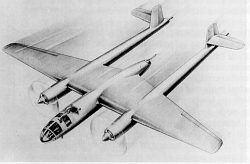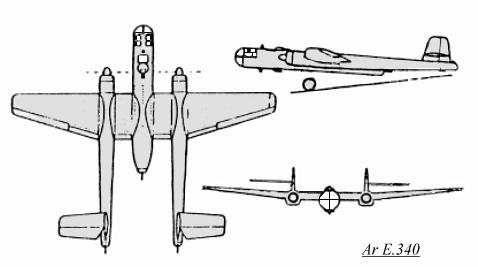
 The RLM issued a specification for a "Bomber
B" design in 1939, to replace the Ju 88 and Do 217 by 1943. Four companies
submitted designs for a twin engine medium bomber that could also dive bomb
and have tactical ground support: Arado (Ar E.340), Dornier (Do 317B), Focke-Wulf
(Fw 191) and Junkers (Ju 288). The design specifications called for top
speed of 600 k/hr (373 mph) at 7000 m (23000') with a range of 3600 km (2236
miles) carrying a 2000 kg (4400 lbs) bombload. If more powerful engines
became available, then a shorter range bombload of 6000 kg (13200 lbs) was
forseen. There were three engines under development at the time that would
fit the requirements: the Daimler Benz 604, the BMW 802 and the Jumo 222.
The Jumo 222 engines were chosen because these were projected to be ready
in the available time frame.
The RLM issued a specification for a "Bomber
B" design in 1939, to replace the Ju 88 and Do 217 by 1943. Four companies
submitted designs for a twin engine medium bomber that could also dive bomb
and have tactical ground support: Arado (Ar E.340), Dornier (Do 317B), Focke-Wulf
(Fw 191) and Junkers (Ju 288). The design specifications called for top
speed of 600 k/hr (373 mph) at 7000 m (23000') with a range of 3600 km (2236
miles) carrying a 2000 kg (4400 lbs) bombload. If more powerful engines
became available, then a shorter range bombload of 6000 kg (13200 lbs) was
forseen. There were three engines under development at the time that would
fit the requirements: the Daimler Benz 604, the BMW 802 and the Jumo 222.
The Jumo 222 engines were chosen because these were projected to be ready
in the available time frame. Span:
22.98 m (75' 4.7") Length:
18.65 m (61' 2.3") Max. Speed: 580 km/h
(360 mph) w/ Jumo 222
625 km/h (388 mph) w/ DB 604
Andreas Otte's art
of the Ar E.340

An artist's impression of the Ar E.340 from 1939....